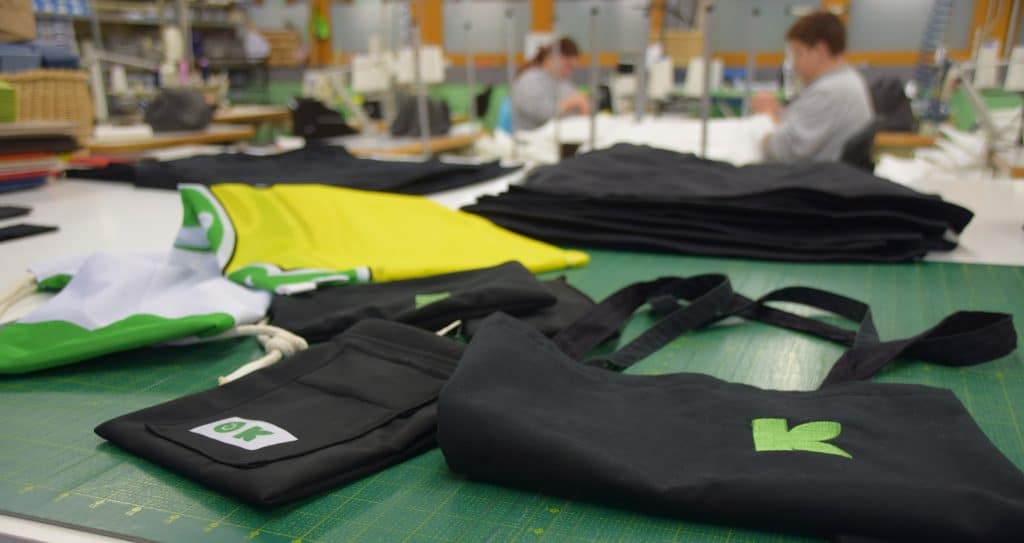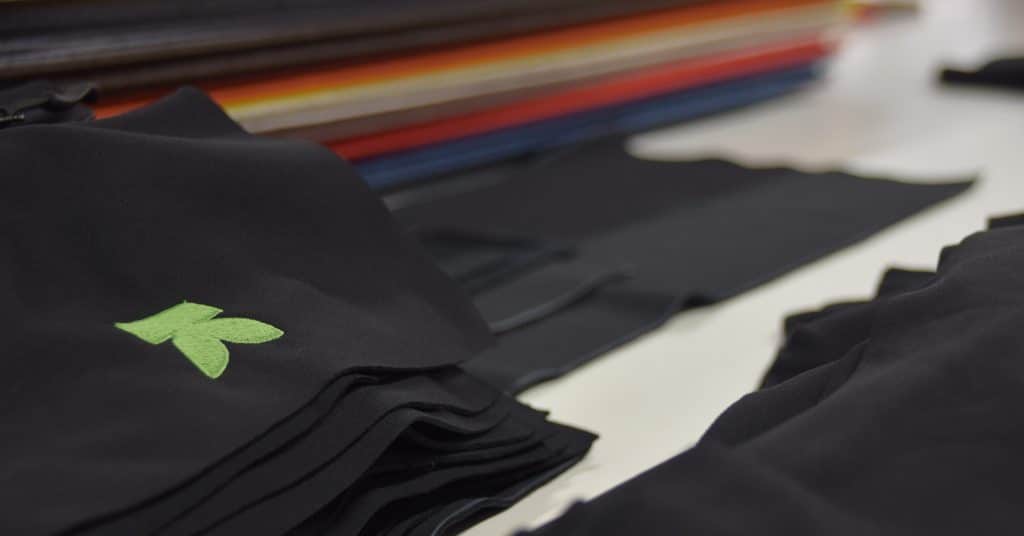Turning old into new – with upcycled promotional materials
The staff at Langenhorst sheltered workshops make gym bags out of flags
What can you do with promotional materials that are no longer needed and gathering dust in the stockroom, but too good to throw away? Klasmann-Deilmann decided to upcycle them and supplied textiles to the sewing room of the sheltered workshops run by Caritas in Langenhorst.
The staff in the sewing room are busy measuring, cutting and tacking, threading needles, hemming and stitching. In the sewing room of the sheltered workshops run by Caritas in Langenhorst, people with disabilities operate the industrial sewing machines and work hand in hand to provide customised products. They supply Klasmann-Deilmann with utensil holders, cotton bags, pencil cases, make-up bags and gym bags, made of materials that come from softshell vests, aprons and flags.
“There were some promotional materials in our warehouse that we simply could not get rid of, such as size XXXL vests,” explained Melanie Hützen, who works in the Klasmann-Deilmann Corporate Identity & Design department. “But it seemed a shame just to throw them away. We came up with the idea of upcycling them because they are not only made of top quality textiles, but are also very large.”
They promptly discussed the project with the sheltered workshops in Langenhorst. The staff at the sewing shop at the Steinfurt branch immediately came up with creative ideas, conjuring up attractive gym bags from flags, turning aprons into cotton bags and making simple pencil cases from the pockets of the vests.
“We are absolutely delighted with the results,” said Melanie Hützen. “The quality is perfect and we think the idea of turning one flag into several gym bags, so that each gym bag looks different, is simply ingenious. These items are sure to be a popular give-away for trainees at job fairs.”
A total of nine seamstresses work at the sewing shop in Steinfurt. Their jobs are like those of most ordinary employees: they have an employment contract, fixed working hours, are entitled to holiday leave and pay. And yet these are special jobs, as they are designed for people with a disability. A normal working day, for instance, does not mean eight hours sitting at a sewing machine. Instead, the employees have breaks for other activities, such as singing or playing a musical instrument, reading the newspaper or taking part in what is known as “training for life”, in which the group practises situations from day-to-day life, such as how to behave correctly at traffic lights.
The work performed by the employees depends on their individual preferences and manual skills. “During the two-year vocational training course, they have the opportunity to try out the different work areas and see how they cope,” explains Paul Dankel, head of the production department at the Steinfurt branch.
The seamstresses in the sewing shop enjoy plenty of scope for creativity. “The seamstresses love to contribute their own ideas,” says Monika Potthoff, Group Manager at the sewing shop. “To begin with, I show them what to do and cut out the materials, but they are absolutely free to choose which fabrics they wish to use – and that is probably what makes this work so special, because the outcome are highly individual products instead of mass-produced goods from an assembly line.”
“That was what we found so interesting,” adds Melanie Hützen. “We wanted creative support and special promotional materials that are not available anywhere else.” The cooperative project has meanwhile saved 490 softshell vests, 64 flags and 253 aprons from being binned and recycled them instead. We will already be able to present our unique promotional gifts at the International Plant Fair in Essen.

